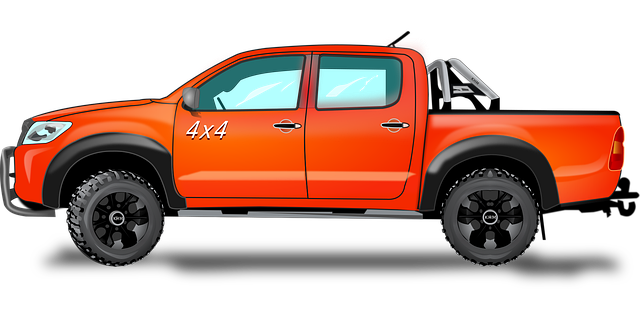When securing insurance for heavy-duty trucks in the trucking industry, it's crucial for operators to consider various factors such as vehicle type and size, cargo value, and routes traveled, as these influence policy premiums and coverage. Liability coverage is essential, especially for protecting against third-party bodily injury and property damage claims following accidents. Physical damage protection, which covers repair or replacement of trucks due to collisions, theft, or natural disasters, is equally important. Specialized insurance like motor truck cargo insurance is vital for safeguarding transported goods against loss or damage. Additional coverages such as on-hook defense can help with legal expenses if a vehicle is impounded post-incident. For optimal insurance strategies, consulting with transportation insurance experts who understand the unique risks of heavy-duty trucking is advisable to tailor coverage to specific operational needs. Robust insurance policies, including cargo protection, are both a legal obligation and a strategic financial measure to reduce losses and ensure business continuity in the event of incidents, ensuring that the pivotal role of trucks in the commerce ecosystem remains uninterrupted. Trucking companies must regularly reassess their coverage as vehicle usage, age, and driver profiles change, adapting to the evolving landscape of trucking insurance to maintain a balance between protection and cost-effectiveness.
Navigating the intricacies of insurance for heavy-duty trucks is a critical task for trucking operators. With the right coverage, owners and operators can safeguard their significant investments and ensure compliance with regulations. This article delves into the essential aspects of heavy-duty truck insurance, guiding you through the complexities and key coverage options that protect your cargo and operations. We explore strategic approaches to mitigate risks and minimize costs without compromising on the robust protection your trucks need. Understanding the nuances of trucking insurance is not just about compliance; it’s a pivotal component in maintaining a successful operation within this demanding industry.
- Navigating the Complexities of Heavy-Duty Truck Insurance: A Comprehensive Guide for Trucking Operators
- Understanding the Necessities: Key Coverage Options for Heavy-Duty Truck Owners and Operators
- The Role of Cargo Protection in Heavy-Duty Truck Insurance Policies
- Strategies for Mitigating Risk and Minimizing Costs in Heavy-Duty Truck Insurance Plans
Navigating the Complexities of Heavy-Duty Truck Insurance: A Comprehensive Guide for Trucking Operators

When securing insurance for heavy-duty trucks, trucking operators must consider a myriad of factors to ensure comprehensive coverage. The type and size of the truck, cargo value, and routes traveled are crucial elements that influence policy costs and terms. Operators should assess the varying levels of liability coverage, including bodily injury and property damage, to protect against third-party claims in the event of accidents. Additionally, understanding the nuances of physical damage protection for the trucks themselves is essential, as it can cover repairs or replacement due to collisions, theft, or acts of nature.
Navigating the insurance landscape for heavy-duty trucks requires a deep dive into coverage options such as motor truck cargo insurance, which safeguards against loss or damage to the hauled goods. Trucking operators should also explore the benefits of optional coverages like on-hook defense, which provides legal representation when a truck is impounded following an incident. To tailor the best policy for their operations, truckers must engage with knowledgeable insurance agents who specialize in transportation and understand the unique exposures faced by heavy-duty truck operators.
Understanding the Necessities: Key Coverage Options for Heavy-Duty Truck Owners and Operators

When operating heavy-duty trucks within the trucking industry, it’s crucial to secure comprehensive insurance coverage tailored to the unique risks associated with commercial transportation. Owners and operators must consider a range of essential coverages to protect their assets and ensure operational continuity. Primary among these is liability coverage, which safeguards against damage or injury claims resulting from accidents involving the truck. This financial protection not only covers third-party bodily injury and property damage but also includes legal defense costs in the event of litigation. Another vital aspect is physical damage insurance, which covers the truck itself against collisions, theft, vandalism, and other incidents that could lead to costly repairs or total loss. Additionally, cargo insurance is indispensable for protecting the goods being transported, as these can be particularly valuable and susceptible to a variety of risks throughout the supply chain. Properly insuring heavy-duty trucks in the trucking sector is not just a legal requirement but a strategic decision that can mitigate financial losses and ensure business resilience in the face of unexpected events.
The Role of Cargo Protection in Heavy-Duty Truck Insurance Policies

When considering comprehensive insurance for heavy-duty trucks within the trucking industry, cargo protection stands out as a critical component. Heavy-duty trucks are often the lifeblood of commerce, carrying goods across diverse terrains and long distances. The cargo they transport represents significant value, making it imperative to safeguard against potential loss or damage during transit. A robust cargo insurance policy can mitigate financial risks associated with freight disputes, theft, or natural disasters. It’s prudent for trucking companies to assess the worth of their shipments and select coverage that matches the monetary value at risk. This not only ensures business continuity but also fosters trust between carriers and clients, as the risk of cargo loss is substantially reduced with adequate protection.
Furthermore, the integration of modern tracking technology in conjunction with comprehensive cargo insurance can provide trucking companies with a dual advantage. Real-time monitoring of shipments enhances operational efficiency and accountability, while a well-designed insurance policy provides a financial safety net. In the event of unforeseen circumstances, this coverage ensures that trucking enterprises can recover losses and maintain their operational capabilities, which is essential for the continuity of supply chains in today’s fast-paced and high-stakes commercial environment. The role of cargo protection within heavy-duty truck insurance policies is therefore indispensable, offering peace of mind to carriers and assurance to clients that their goods are protected throughout the journey.
Strategies for Mitigating Risk and Minimizing Costs in Heavy-Duty Truck Insurance Plans

When securing expert insurance for heavy-duty trucks within the trucking industry, risk mitigation and cost minimization are paramount. Operators can reduce risks by implementing rigorous vehicle maintenance schedules to prevent breakdowns and accidents caused by mechanical failure. Regular training for drivers on defensive driving techniques not only enhances safety but also often leads to lower insurance premiums due to reduced accident rates. Furthermore, carriers should consider investing in modern telematics systems that monitor vehicle performance, speed, and route optimization, which can provide insurers with data demonstrating a commitment to safe operations and potentially qualify for discounted rates.
Another strategy for managing costs in heavy-deductible insurance plans is to carefully evaluate coverage options. Opting for higher deductibles can significantly lower monthly premiums. However, it’s crucial to ensure that the chosen deductible level remains financially manageable should a claim be necessary. Additionally, fleet owners should regularly review their policies to account for any changes in usage, vehicle age, or driver profiles, as these factors can influence insurance costs. By staying informed about the evolving landscape of trucking insurance and actively managing these elements, trucking companies can protect themselves against unforeseen expenses while maintaining a robust level of coverage.
In conclusion, operating a heavy-duty truck requires careful consideration of insurance needs to ensure comprehensive coverage. Our guide has demystified the complexities associated with these policies by outlining essential coverage options, emphasizing the critical role of cargo protection, and providing strategic insights for risk mitigation and cost minimization in trucking insurance plans. For trucking operators looking to secure expert insurance tailored to the demands of heavy-duty trucks, understanding the nuances of each policy is paramount. By leveraging the information presented here, fleet owners can navigate their insurance options with confidence, safeguarding their operations against unforeseen events on the road.
